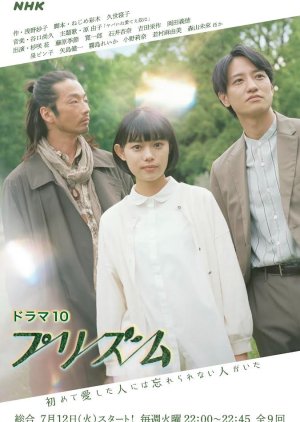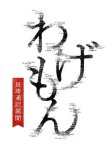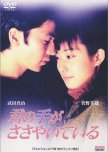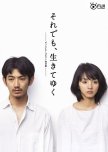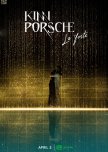
Boule à facettes
La NHK, particulièrement par les dramas produits, et comme la plupart des télévisions publiques des démocraties, a souvent accompagné les changements sociétaux de son pays. Mais il faut dire que le Japon a une force d'inertie typique des pays asiatiques lorsqu'il s'agit des droits des minorités. En réalité, je n'aime pas cette catégorisation des gents. Et dans un pays où le genre ne se différencie pas dans la grammaire, de grands efforts sont encore à faire, si ce n'est que pour l'égalité homme-femme dans le travail. Le schéma "université-travail-femme au foyer-enfant" à la vie dure et reste dans la tête de la plupart des citoyens de ce pays, "the japanese way of life", même en 2022. Alors, quand il s'agit de parler d'orientation sexuelle ou simplement d'un mode de vie qui ne rentre pas dans la norme pour des femmes, comme des hommes, au mieux c'est de l'indifférence. Mais souvent, c'est de l'incompréhension et au pire un rejet à la limite du dégout. C'est avec les différentes facettes de Prism, ce Yoru-Drama à la sensibilité exacerbée, que la télévision publique va tenter de faire bouger les lignes de cette société figée.C'est la mise en avant de la confusion des sentiments de plusieurs générations qui est au cœur de l'intrigue. L'intrigue qui débute de manière, on ne peut plus classique. Et cela, pour parler à toute la société japonaise. Avec la fragile et toute jeune Sugisaki Hana qui monte à Tokyo pour réaliser son rêve de devenir seiyuu, contre l'avis de sa maman resté au pays. Et qui finalement, de petit boulot en petit boulot, l'abandonnera raidement pour vivre comme tant de millions de célibataires de la mégalopole. La sensibilité que dégage Hana-chan est au service d'un maelström de sentiments qui vont la gagner tout le long des 9 épisodes. S'éloignant de sa mère et se rapprochant de son père qui a quitté la maison après avoir enfin assumé son homosexualité. Elle est tiraillée dès le début entre ses deux êtres qui ne se comprennent plus. Et c'est avec elle que l'on apprend justement à comprendre les sentiments de chacun face à une situation que l'on pensait inimaginable (du côté de la maman) et pourtant si évidente et que l'on voudrait, en 2023, banale. La NHK, la production et les acteurs construisent cette série comme de la dentelle. Pas à pas, avec cette sensibilité et cette lenteur nécessaire à l'acceptation qui n'est, on le comprend en rien, une trahison du père envers sa famille.
L'histoire prend part dans les métiers du paysagisme urbain et tout particulièrement dans l'aménagement des jardins. On prendra donc un plaisir non fin à accompagner ce tourbillon de la vie d'une qualité visuelle qui flatte la rétine. Cette immixtion des plantes dans le béton résonne avec le grain de sable qui enraille le bon fonctionnement de la cellule familiale à la japonaise. La fragilité de celle-ci, mais aussi leur beauté et parfois le caractère futile, mais tellement indispensable de leur présence, sublime l'histoire. Elle apaise et aide à la réflexion dont ont besoin les protagonistes. Le déracinement et l'épanouissement dans un endroit hostile n'est-il pas en résonance avec le vécu de nos héros ?
Les endroits hostiles sont nombreux. À la fois la famille, qui n'est rien d'autre que la reproduction en miniature de la société qui n'en fini plus d'être patriarcale. Comme ces terrariums que notre héroïne compose si bien et qui est la reproduction d'une nature emprisonnée par le verre. Ce verre qui représente les règles établies depuis des millénaires par la communauté. À travers le prisme de la société, la famille, le travail, les amis, chaque sentiment est amplifié, déformé et magnifié par les couleurs et la lumière de la pâte visuelle appliquée à la série, comme à travers un bocal.
Mais le prisme représente aussi tous ses triangles amoureux. À commencer par la génération du père de notre héroïne, tiraillé entre sa famille et son conjoint. Puis notre héroïne, elle-même, pour qui son ami d'enfance éperdument amoureux n'est rien d'autre pour elle. Très vite, elle trouvera l'amour, mais son petit ami, interprété par l'excellent Fujiwara Kisetsu, aura lui-même des comptes à régler avec son passé. Surtout quand son ancien béguin chassé par sa famille reviendra dans sa vie. On suivra donc le long chemin de Fujiwara Kisetsu pour accepter et faire accepter enfin son homosexualité. Nul doute que cette série peut faire référence pour toutes les générations qui ont besoin de ce parler et de se comprendre. Pour ceux qui ont besoin d'être accepté et de se faire respecter, mais aussi de s'accepter. Même si elle est très romantisée, elle n'est pas fleur bleue et s'ancre dans la réalité. La musique peut paraitre surfaite pour accompagner ses émotions, mais comme souvent, elle est d'une qualité exceptionnelle et les thèmes restent en tête bien longtemps après avoir vu la série. Et que dire de cet excellent choix d'une vielle chanson de Matsutoya Yumi (je crois) qui magnifie chaque fin d'épisode. Cette série vous fera vibrer et réfléchir et je l'espère, vous ouvrira l'esprit. Mais je suis sûr que vous n'en avez nullement besoin, sinon vous ne m'auriez pas lu jusqu'au bout.
Cet avis était-il utile?

Marija Dolly Milosevic
13 personnes ont trouvé cette critique utile
Cette critique peut contenir des spoilers
Ok, this was a long ride. Before you read my review, I will need to tell you a few things that might explain this whole review better:• I watched only a few Japanese dramas. 10% of them are the ones I did not like, not at all, and 90% are absolute pure love. No middle ground.
• I dropped Prism after the 1st episode, but I was persuaded to go back, and that was my 5th attempt to drop something. I failed, again. I am glad I returned. I am glad I waited months for subs, literally a month or slightly more between the episodes.
But what makes Prism so significant to me, and why I had to review it!? I will try to be as precise as possible:
FL is gentle, delicate, imperfectly perfect, and absolute sunshine. Which made her so strong and slightly unreal, but I loved how sometimes I wanted to b***ch about her, but she said and did everything right. Her character broke me.
Dialogues are very nice, very civilized, and very down to earth. Everything about this drama is down to earth. I love the explosion of emotions, but Prism gave me the needed balance.
I was scared, the whole time that the story would walk into some silly cliche, but it did not. Thank heavens, I would be so pissed otherwise.
I loved the aesthetic, a lingering feeling of undefined relationships, a mixture of love, friendship, reality, and sacrifice. The whole story about the perseverance of memory, past, and families really had a decent depth. And I do not believe everyone would see the beauty and the ugliness of a CHANGE.
This might not be the masterpiece, but this drama did something for me, hurt me a little, shook me a little, and made me feel something, which is just enough for me.
Cet avis était-il utile?

Cette critique peut contenir des spoilers
How does my garden bloom?
Thank you eveychooey for the subs!https://www.d-addicts.com/forums/memberlist.php?mode=viewprofile&u=432456&sid=04f4429358a5cb9296c0e388e215fd27
I have been going deeper and deeper into this rabbit hole called dorama and so far I have dropped just a few of japanese dramas. This one came highly recommended from the first time it aired and I started watching it untill I realized it had not been fully subbed so I dropped it! Started it again and dropped again and again and again.... And then all of a sudden I binged the seven remaining episodes in a day!
"There are things you don't understand until you are part of them."
Prism is a serious, sensible and sensitive, thought provoking drama dealing with acceptance and search for self fulfillment.
Satsuki is a young women torn between her divorced parents and not knowing what to do with her life. The only real passion she has is creating terrariums. One of her creations attract attention of Riku who gives her job in his company and promptly starts dating her. But everything gets very complicated when he meets again his college crush he hadn't seen in seven years. A difficult triangle is formed.
Prism deals with feelings, family pressure, influence and acceptance. It is very theatrical in its realisation, there are a lot of conversations, very calm conversation (the restraint is the main feature of all characters!) culminating in a heart to heart discussion of the three main characters in a forest: they seemed to be all alone in the world!
I do not know much about japanese society today but from what I read: the young people do not want to get married or have kids and that is a huge problem for the country, the families do exercise pressure but it is working less and less. The women particularly are expected to stop working and stay at home when they are married and with kids. A side couple shows that it is possible to work and be married at the same time when both are willing to compromise and the companies are open minded.
Another side story talks about same sex couples and how the partner is not recognized as a family in case of medical emergency. Things seem to evolve in that area as well, slowly but every change needs time!
The main story is Riku and his unresolved feelings from the past. In college he had a crush on his professor who unexplainably and suddenly left. When they meet seven years later, he is unsure of his feelings which ruins his relationship with Satsuki.
"I don't know if I'm gay. I do not want to see men naked!"
This makes it perfectly clear that though the professor had feelings for him, Riku's feelings were those of admiration not love which becomes clear as their relationship progresses in present.
In the end the three of them remain friends tied together with the common love of gardening and nothing more!
The series was filmed beautifully, the lush gardens, the hazy air, warm colours, soft and quiet. What I did not like was the music: very often heavy sounding cello solos in rather simple situation while the serious scenes were accompanied by cheerful very ill fitting music. The actors were perfect. The characters were extremely well written and the actors managed to convey their thoughts and feelings with tiniest of microexpressions!
This is a drama for a confirmed watcher as the themes it deals with are rather serious, there is no fluff and the feelings are so restrained.
Cet avis était-il utile?

Cette critique peut contenir des spoilers
Watch this for MDL 2024 Watch Challenge. But quite a meaningful drama…Story about Maejima Satsuki, a woman who lost her way in life. Satsuki doesn’t know what she’s good at nor her purpose in life. She went to Tokyo to be a voice talent, but at the moment she is on the verge of giving up because she thinks she lacks talent. To fill her days and also to support herself, she works part-time at a garden centre in Tokyo. But that’s also making her question herself, cause one day Morishita Riku criticized herself that she’s just only working at the garden centre cause she needs to fill her time, not cause she takes the job seriously. And with that question, MS started to question herself & want to find her purpose.
The more Satsuki thinks about plants, the more intrigued she is with it. So starting with the terrarium that Satsuki made, Satsuki ends up helping out with a garden project Riku has undertaken. And before long, Riku & Satsuki relationship bloomed into something more.
But one day, Hiraishi Yuma, a plant expert, came as the gardener for their project. From then on Riku & Satsuki relationship began to experience trials. ‘Cause later we learn that Riku & Yuma's past relationship is not as simple as they show.
The trouble comes not only in the form of their love triangle, but also their company. Their company went through a hard time, because of a lack of finance. And when Riku tried to get help from his father, his father give a condition that’s not easy to fulfill. So, how do Riku and Satsuki go through all the hardship in their life…?
Overall this is a good drama to quite get the portrayal of the harsh reality of not what people consider as normal life. Satsuki always question is it normal, what is considered normal…? Well I’ll spill what she means down below, cause it’s quite a spoiler. So… SPOILER ALERT!!! Read it at ur own risk.
==================================================
SPOILER ALERT!!!
==================================================
* Satsuki doesn’t want to get married, not only because she had trauma regarding her parents' marriage, but she just thinks marriage is not for her.
* Riku & Yuma are a couple that are still so much in love with each other. But the rejection from society and especially from Riku’s father made them separated and this also made Yuma afraid to move forward with their relationship. And when Riku & Yuma meet again, all the tension in the air between them, made Satsuki really question their feelings for each other and in the end made herself insecure about her relationship with Riku.
* The crazy Riku’s father (Morishita Sakuji). The condition Sakuji gave to Riku is for Riku to settle down and get married. Because Sakuji is afraid that Riku really a gay, especially since Yuma also came back to his life. So, at first Satsuki offered to just fake their marriage & get the divorce after the financial problem was solved. But overtime, Riku wants to take their marriage seriously & Satsuki, who never intended to be married, thinks it as a problem. In the end Satsuki & Riku indeed separated, but what best is Satsuki can make Sakuji understand that normal life is not for everyone & to just accept Riku as not only his son that can be controlled, but also as an independent human that has his own opinion.
* Satsuki’s dad is gay & that puts a scar into Satsuki’s heart. But in the drama we can see how Riku helps Satsuki to make peace with her dad’s relationship. How in the end Satsuki successfully mends her relationship with her dad & accepts her dad’s partner.
Cet avis était-il utile?

